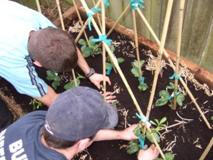Patch from Scratch June 09 Organic veges in your own back yard

I’ve spent lots of time during May preparing my vege garden for winter. If you use an irrigation system, don’t forget to decrease the frequency or turn it off all together in preparation for the rainy months. I’ve tucked up all my plants with a good feed and a thick layer of mulch, and finally, finally I am getting the potager pinned with weed mat broken shell laid on top. It is looking spiffingly smart! I must admit I have meaning to shell the potager for ages and ages and I’ve only finally got round to having it done because we are selling our house. This little business has finally outgrown the kitchen table! I swear though, the next house we move into, I’m going to spruce up the garden first before I even open a pot of paint.
Garlic growing tips
Traditionally, garlic is planted on the shortest day of the year (June 21st) and harvested on the longest day. You can pop it in a couple of weeks early or late – up until early August. Just put a label where you plant it with the date on. Lime and add manure to soil a couple of weeks before planting. Plant healthy looking cloves that still have their skins on with the pointy end up. Plant 3-5cm deep and about 10cm apart. Don’t use the garlic that you get in the supermarket most of it is imported from China and sprayed so it will never sprout. Use garlic cloves from your local garden centre or contact Koanga gardens and get some fantastic heirloom organic varieties posted to you. Keep the surrounding area weed free.
Be sure the cloves get plenty of water whilst growing. Stop watering 1 month prior to harvest when tops begin to turn brown, water can cause bulbs to rot at this point. If flower stalks appear, remove them so that the plant puts energy into growing bulbs not flowers.
Harvest garlic in December when the foliage turns brown and stems soften. Loosen soil around the bulbs and pull out. Store garlic along with their foliage for 2-3 weeks in a dry dark place. Once tops are dry, remove old roots and foliage and store in a paper bag or plait the foliage and hang until needed. For garlic to be planted next season, keep tops on and do not separate cloves until ready to plant. From planting to harvest usually takes about 6-8 months.
Liquid Herb Feed
To ensure your vege garden continues to flourish throughout the winter, use this liquid herb feed to promote good health.
Collect any of the following herbs, place in a bucket and cover with water.
Tansy, comfrey, chamomile, stinging nettle, valerian. Put lid on bucket.
Leave for one month then dilute to ½ strength. Pour around base of garden plants and trees.
Calendula

Calendula, which is also known as Pot Marigold, is the perfect addition to any garden. Due to its resistance to the cold weather, it is one of the few companion flowers available during winter and helps brighten the garden as well as repel insects when planted beside capsicum and tomatoes.
Calendula is often used for medicinal purposes as when used in a tea it can be a soothing remedy for gastrointestinal problems; can be a healing wash for skin disorders or pain, including nappy rash and can be easily infused into oil for healing balm. The edible petals make it a welcome garnish to any dish or it can be used in salads to add some extra flavour.
To use calendula to combat nappy rash, add ½ cup of petals to 1 ½ cups of boiling water to make a strong tea. Cool and strain before bathing the affected area in the tea.
Patch Helping Hands
In mid May, Patch from Scratch, along with a huge group of helpers undertook a working bee at Greenlane Christian Centre to turn a disused garden into a working vegetable garden, to provide fresh veges for their food bank. Daltons very kindly donated a heap of organically certified compost and Oakdale organics generously gave us lots of certified organic seedlings to get them off to a great start.
We were overwhelmed at the number of people who came along, gardening gloves and all to help out. We had children and adults of all ages building the patch structures, clearing land, painting tiles, layering the compost and pea straw and planting a range of vegetables and plants throughout the four large patches. What was achieved in just a few short hours was incredible and shows what a bit of team work can do! The working bee was documented by the Sunday programme and will air in three – four weeks, so keep your eyes out for it!
What to plant in June
Bok Choy Broad Beans Broccoli Cabbage
Cauliflower Chinese Cabbage Garlic Onion
Peas Radish Swede Silverbeet
Perpetual Spinach Turnip
If you want to grow your own veges and could do with a helping hand to get the right start, then you may want to seek help. Patch from Scratch offers an all inclusive service building vege beds for beginner organic gardeners and busy people and helping you to get up and growing. We also offer Kits sets for DIY enthusiasts and a consultancy service for people who really want to do it all themselves but just need a bit of guidance.

Sarah Davies
Patch from Scratch Ltd
PO Box 11-105
Ellerslie 1542, Auckland
phone 09 525 7897
mobile 021 334 603
email sarah@patchfromscratch.co.nz


I am trying to get grape vine graft wood for a very old variety called Bishop Pompallier or Black Dalmatian. I have a very prolific growing vine that does not set fruit so want to graft onto a variety that is disease resistant and a known good cropper. I live on Northshore in Auckland.